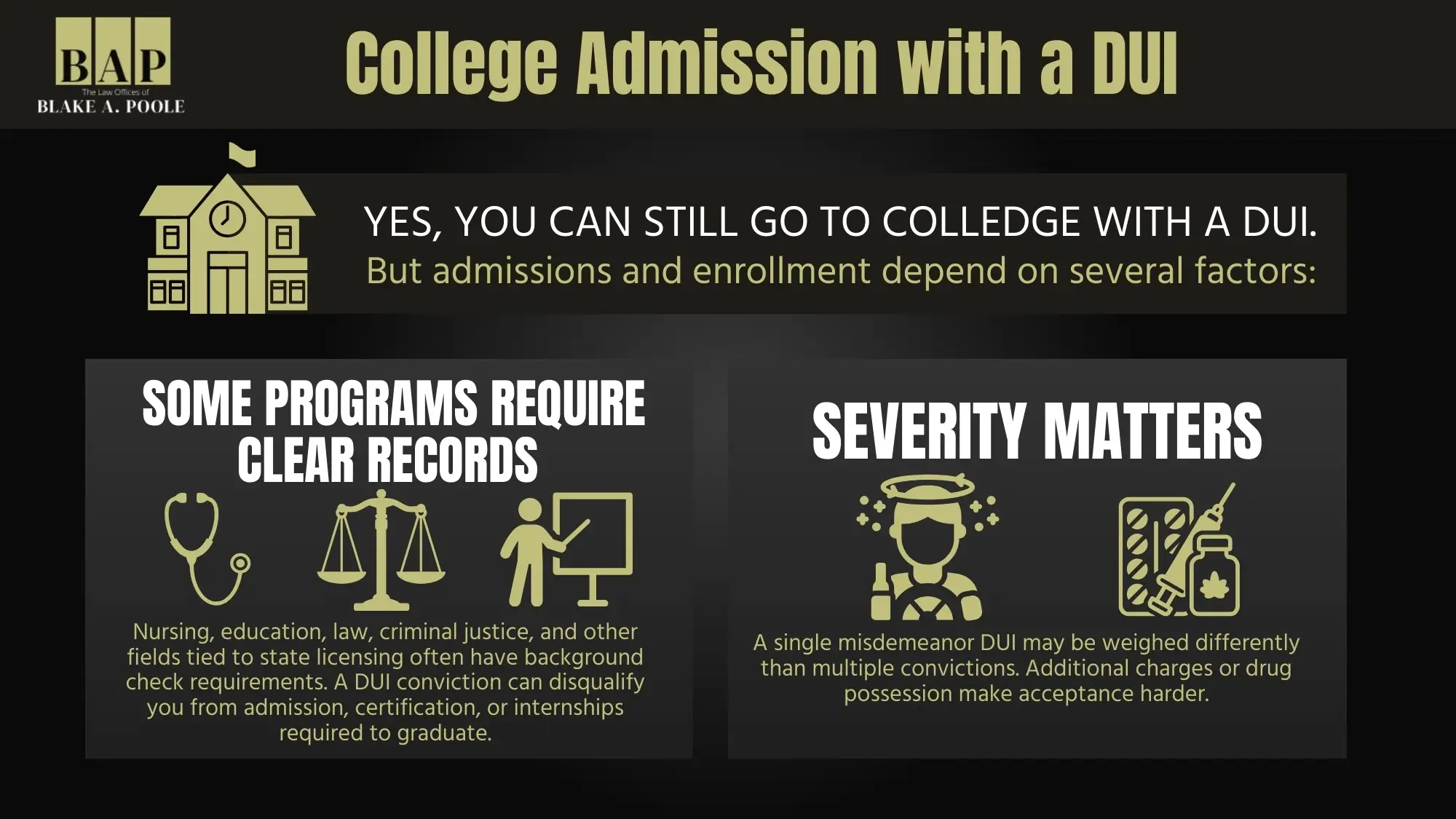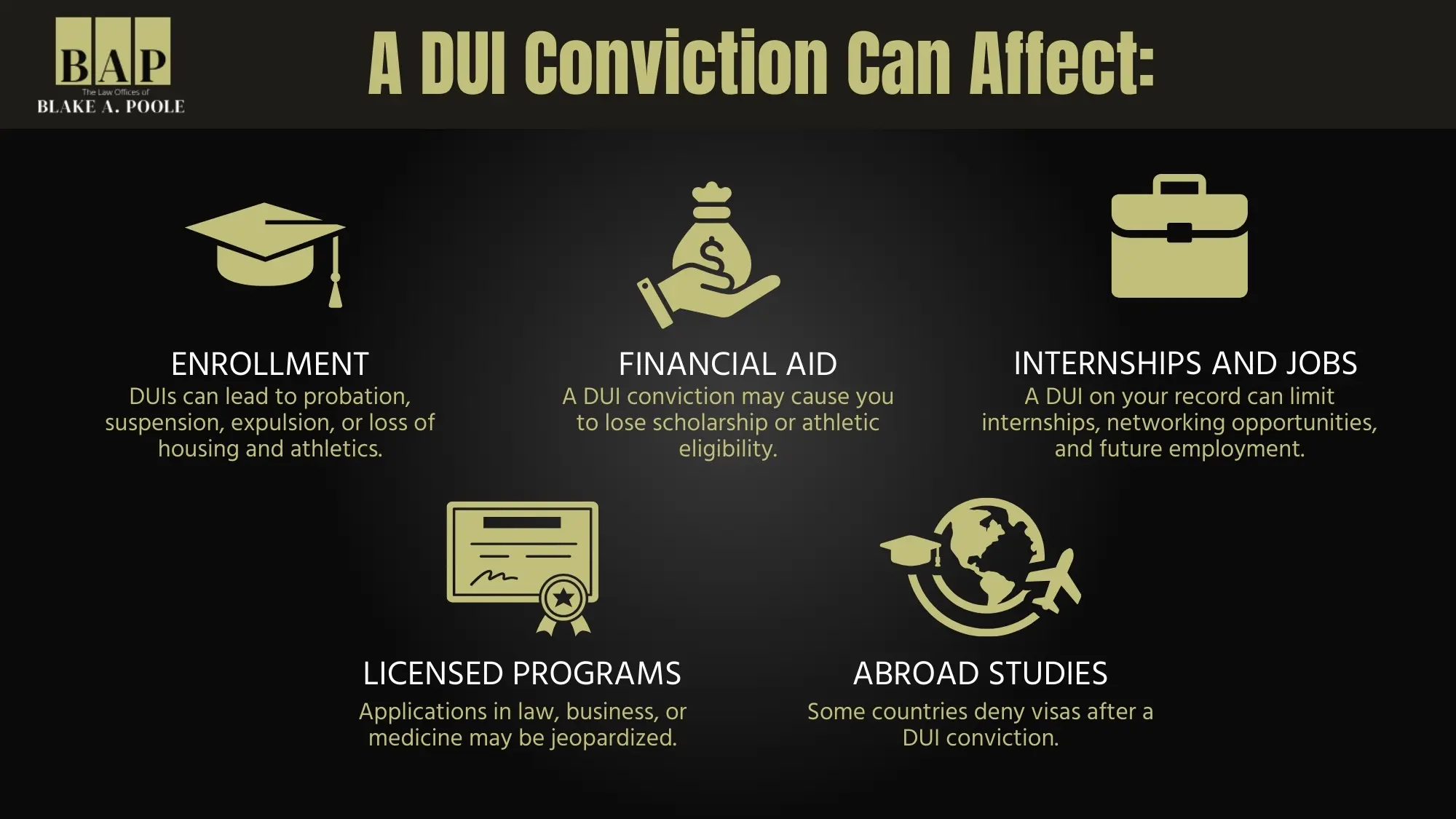August 4, 2025
By Blake A.Pool
Free Consultations
|
24/7 for Emergency Help

October 1, 2025
By Blake A. Poole
For many young people in Gainesville and across Georgia, higher education is the key to long-term opportunities. But what happens when a DUI arrest or drunk driving conviction enters the picture? One mistake involving alcohol or illegal drugs can raise real concerns about college admissions, financial aid, and a student’s future.
This article explains how a DUI conviction can affect your ability to go to college, what schools may require you to disclose, the potential consequences for your college career, and how working with an experienced DUI lawyer can help protect your future.

The short answer is yes — you can go to college with a DUI, but acceptance of your college application depends on several factors. Universities and technical schools may review a criminal conviction as part of the admissions process. For example, at Georgia Tech, applicants are required to disclose any criminal convictions or charges beyond a minor traffic violation as part of the Discipline Review process. And the University of North Georgia's Public Safety Academy program requires applicants to “pass a criminal background check and driver's history report”.
A first offense doesn’t automatically bar you from attending classes, but the severity of the DUI offense, how it appears on a police report, and whether you were also charged with other criminal charges (such as drug possession) may influence the decision.
Some schools have strict conduct requirements and may issue disciplinary actions if a student is convicted during their enrollment.

Most schools require applicants to disclose any criminal convictions on their college application. Failing to report it when disclosure is required could lead to rejection, expulsion, or problems later in your college career.
Admissions committees often weigh more than the conviction itself, as they may look at:
Certain academic majors or career tracks carry stricter rules:
Whether you are enrolled at the University of North Georgia, Georgia Tech, or another university, staying in school requires more than attending classes. Students must also follow their institution’s code of conduct, which often includes rules about criminal convictions.
If you plead guilty to a drunk driving offense while enrolled, your school could impose disciplinary actions such as probation, suspension, or even expulsion. Losing your place at school could derail your college career and delay completing your degree.
Some schools may also restrict access to campus housing, student organizations, or athletics after a DUI conviction.

Many students rely on a mix of financial aid, loans, and scholarships to pay for school. While a DUI alone does not always eliminate federal aid eligibility, cases involving illegal drugs can.
Some private and athletic programs revoke awards after a criminal conviction or disciplinary actions. A DUI conviction may cause you to lose aid for the semester in which the offense occurred, or even permanently. A student-athlete who loses an athletic scholarship may also lose the ability to compete or even attend classes full-time.

Graduating with a degree is only part of building a successful future. Internships, work-study programs, and networking play a big role in career development.
Unfortunately, a criminal conviction can appear on a background check and negatively impact your ability to secure these opportunities. Employers, especially in competitive fields, often weigh an applicant’s record heavily.
Even volunteer positions, student government, and campus leadership roles may require a clean record. This can limit both your résumé and your professional connections.
The potential consequences of a DUI for a college student go beyond admissions and aid:

A single offense does not have to define your future. Having a skilled attorney review your case can make a significant difference in how you deal with DUI charges. Depending on the circumstances, it may be possible to reduce penalties, protect your education, and avoid long-term harm to your life and career.
Example: A student arrested for drunk driving after a football game may face both court prosecution and school discipline. With expert legal guidance, they may be able to keep their record clean, maintain enrollment, and avoid losing financial support.
So, can you go to college with a DUI? In most cases, yes, but the impact on your college career, scholarships, and educational opportunities can be significant. Whether you’re worried about a pending college application, continuing your degree, or applying to graduate school, the right legal help can make all the difference.
Here at The Law Offices of Blake A. Poole, we understand how a DUI arrest can disrupt both your life and your education. If you’ve been arrested or convicted, don’t wait — contact our Gainesville office today for a free consultation.
Don't face criminal charges alone. Our experienced defense team is available 24/7 to protect your rights and fight for your future.
A DUI doesn’t have to end your college goals. Attorney Blake A. Poole in Gainesville has years of experience helping students navigate the legal system and minimize the impact of a DUI conviction. Contact our office today for a free consultation and learn how we can help you protect your future.
Lorem ipsum dolor sit amet, consectetur adipiscing elit. Suspendisse varius enim in eros elementum tristique. Duis cursus, mi quis viverra ornare, eros dolor interdum nulla, ut commodo diam libero vitae erat. Aenean faucibus nibh et justo cursus id rutrum lorem imperdiet. Nunc ut sem vitae risus tristique posuere.
We begin working immediately to preserve evidence, interview witnesses, and file necessary motions. Early intervention often prevents charges from being filed or reduces their severity.
You have only 30 days to challenge your license suspension. Every day you wait makes it harder to build a strong defense. Call now!
Block Quote